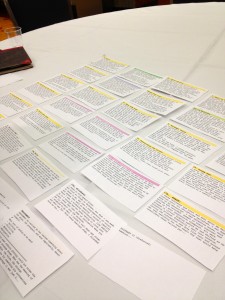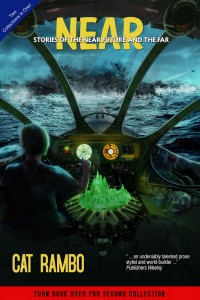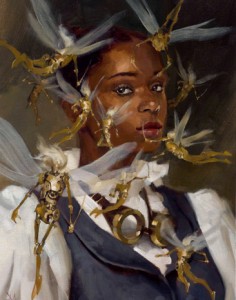
One of the most interesting things about a collaboration is a chance to see your collaborator's process in action. Here are the story cards for "Haunted," which Bud brought with him to WorldCon so we could grab a table in the green room and go over them.
I haven’t done that many. “Logic and Magic in the Time of the Boat Lift” with Ben Burgis resulted from Ben describing what he wanted to write a story about — Miami and were gators and coke dealers — at more than one Wiscon. I wrote the beginning and sent it his way, and the back and forth began. Now we’ve got a similar lump in process.
Gio Clairval and I just finished up a flash piece recently. One of the things I’ve done to encourage collaborations is stick a bunch of word lumps up in a Google doc and just shared the doc so people could take a look and see if anything sparked. She liked a piece I’d done based on an image of a female acrobat.
Right now Bud Sparhawk and I just finished the novella “Haunted,” which started as a short story and kept growing and growing and growing. Bud plots things out a bit more thoroughly than I do, and it’s been interesting so far. Here we worked in Scrivener and laid out a story arc in cards before really setting to writing. I enjoyed it, because I think we’ve got a killer idea, and some clever twists, and some things that will hit nostalgic sweetspots.
So here’s my advice on collaboration based on my experience, which is somewhere past utterly new at it and yet not in the range of people like Mercedes Lackey, Andre Norton, Mike Resnick, and countless more.
- Pick a collaborator whose speed (roughly) matches yours. Bud was writing faster on ours, and I know there were several times where I was the holdup. Too much of that can get frustrating, as I’m sure he can attest.
- Pick a collaborator who doesn’t take things too seriously (and don’t do that yourself). If someone has got something (real or imagined) at stake, the pressure may be uncomfortable.
- Pick a collaborator who is flexible, and similarly be prepared yourself to sacrifice cherished ides, because you can always use them elsewhere.
Collaborative benefits include (for me, at least) new energy, someone to discuss a story with as it’s written, new insights into process, fresh ideas, and a kick in the butt to be productive.
Enjoy this writing advice and want more content like it? Check out the classes Cat gives via the Rambo Academy for Wayward Writers, which offers both on-demand and live online writing classes for fantasy and science fiction writers from Cat and other authors, including Ann Leckie, Seanan McGuire, Fran Wilde and other talents! All classes include three free slots.
Prefer to opt for weekly interaction, advice, opportunities to ask questions, and access to the Chez Rambo Discord community and critique group? Check out Cat’s Patreon. Or sample her writing here.






